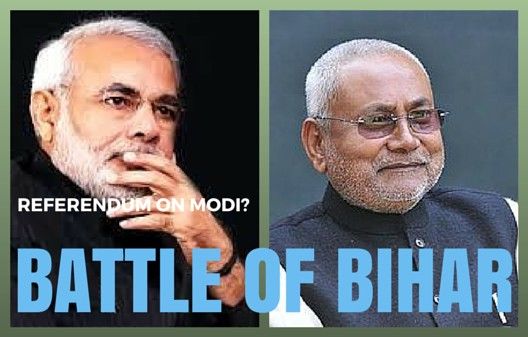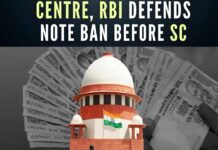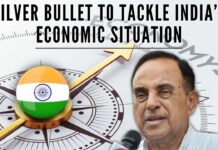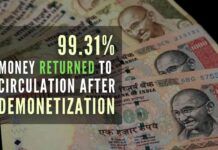
Navin Upadhyay
New Delhi
Despite black money emerging as a cause célèbre in the last Lok Sabha polls, the upcoming Bihar assembly polls may see huge amount of unaccounted wealth finding its way into the economy through the corrupt alleyways of politics.
The Election commission of India (ECI) has set an upper limit of ₹28 lakhs ($42,000) per candidates, but this is nothing but a joke. The candidates spend at an average four times more money, and their parties an equal amount.
The (ECI) committed the original sin by ordering a five-phase month-long poll schedule. This alone will multiply the poll expenses of the parties and candidates and come as a major incentive to the party or alliance with more money power. The ECI could have easily reduced the number of phases especially since Bihar was the lone state going to poll at this time and the centre could have been asked to provide para military forces to hold a single-phase poll.
Given the nature of the polls where the outcome could decide the fortunes of both Prime Minister Narendra Modi and Nitish Kumar and Lalu Prasad, the stakeholders are bound to unleash black money in a big way to reach out to the voters. The EC has already identified 64 assembly segments where it reportedly fears massive inflow of black money. Vigil has been increased on the Indo-Nepal border to stop inflow of fake currency notes to buy the voters. The Election Commission has also conducted a workshop for nodal officers who will keep an eye on the flow of black money and other illegal allurement during the polls.
Over the years, the Election commission has imposed several restrictions on poll related expenditure of candidates, especially on publicity and campaign cost. But the parties have found innovative ways to get around the EC’s restrictions, thanks to a section of corrupt media. Believe or not, “paid news” has become an ugly phenomenon in Indian elections.
I’ve been in media for long enough to see this from close quarters and also from the eyes of my colleagues in different newspapers. First, the newspapers are bribed and paid huge sums of money to help a particular party during the polls by highlighting it leaders, giving more space to its candidates, and publication of favorable stories about its prospects. In the last Lok Sabha polls, some vernacular newspapers were allegedly paid as much as ₹25 crores ($3.62 million) each allegedly by a political party to “rig’ the public mood. Smaller papers were paid smaller sums. Of course, not all newspapers or channels are part of this racket, but a section is surely compromised.
The second aspect is bribing individual journalists, both stringers and senior level guys who are involved in reporting. The EC has come down on the paid news, but the media has found a different way to overcome it.
Similarly, political parties spend huge amount of money in manipulating the findings of Opinion polls. Two years ago, a sting operation showed that even well-known established in-house psephologists and their companies took money to make wrong projections. Having been exposed, many of these rogue houses have changed their names and are back in business!
While these are comparatively smaller expenses, the real bucks go to polling agents, volunteers, workers, candidates put up to cut votes of rivals, distribution of liquor and cash. In the past, Bihar saw relatively lesser use of black money in comparison to southern states, but this time around the stakes are so high that black money is bound to find its way into the system in a big way.
Political parties have to account for their expenses only after the model code of candidates comes into effect. But the actual campaign starts much before that when mega rallies are held to woo the voters and herald the battle. Prime Minister Narendra Modi held four such mega rallies while Nitish Kumar-Lalu Prasad-Sonia Gandhi organised a mammoth gathering in Patna. In such rallies hundreds of thousands of people are ferried from all corners of the state. They are also paid cash and provided food and stay. Thousands of workers involved in arranging such rallies have to be also paid. Each of these rallies could cost anything between ₹5 cr ($0.75 million) to ₹20 cr ($3 million).
Then there are `vote-katwas’–candidates and parties who take part in the battle to purely to cut into votes of a candidate of a particular party to help the rivals. Such “vote-katwas’ are paid huge money. Pappu Yadav, Majlis-e-Ittehadul Muslimeen’s chief Asaduddin Owaisi, and candidates of the Samajwadi Party (SP) are the prominent `vote-katwas’ in Bihar. While SP may have its own compulsions—the ongoing CBI probe into Noida engineer Yadav Singh’s illegal wealth and his disclosure about the alleged involvement of a SP leader’s son in his wheeling dealing—to field for the BJP in the poll battle, the political buzz in Bihar is that a great deal of money has exchanged hands to persuade other ‘vote-katwas’ to jump into the fray.
Even if an average of ₹1 cr ($151,000) is spent by each candidate of the BJP-and RJD-led alliance, then nearly ₹500 cr ($75 million) will flow into the system through normal route. At least, an equal amount of money will be used by the two main players on overall expenses. No one should be surprised if as much as ₹1000 cr ($150 million) is spent in the Bihar polls.
The EC will never be able to crack down on the black money. Candidates will fudge their books and the EC will accept them. Yet another poll would pass by in which black money would be on the lips of every candidate and party. But the same black money will also come in handy for them to win the polls. That’s why there is a great deal of skepticism that no political party in India will ever make a serious effort to rid the system of internal black money. After all, no political party is ready to come under the Right to Information Act and submit the source of money flowing into its coffers!
Note:
1. The conversion rate used in today’s article is $1 = ₹66.35.
- The rise of Patanjali:An Indian yogi’s challenge to MNC giants - January 26, 2016
- Padmas – a blend of excellence, politics and ideology - January 25, 2016
- Scared of hispopularity, British wanted to hang Netaji - January 24, 2016










